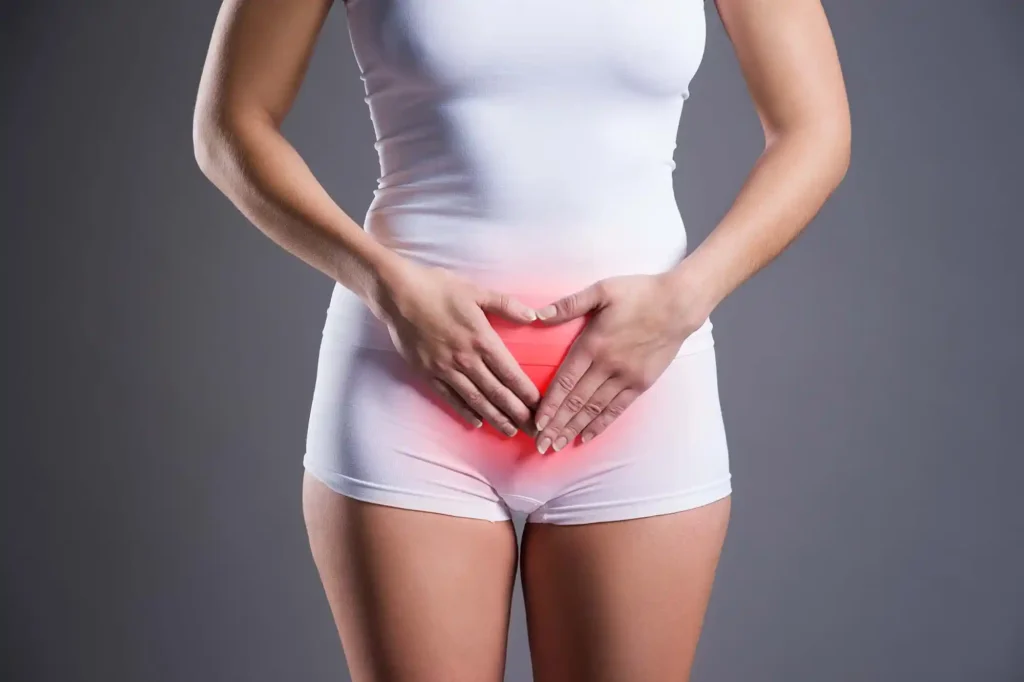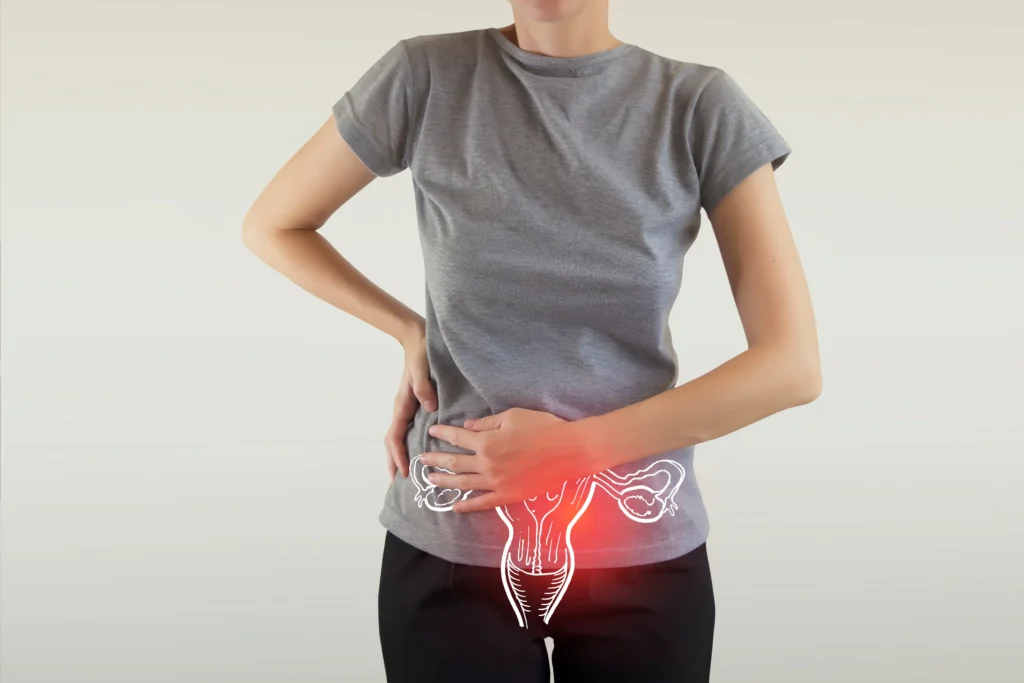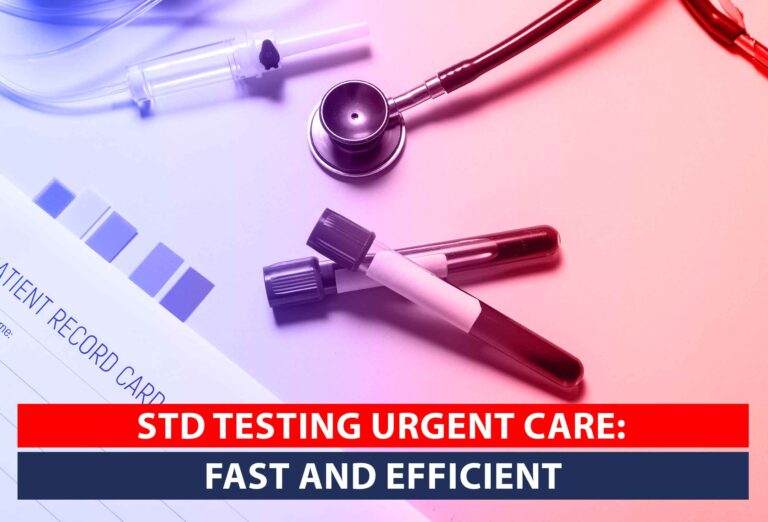Ovarian cyst refers to fluid-filled sacs that develop on the ovaries or within the ovaries. Most women go through them without significant problems, but some of them ask themselves: Can A ovary cyst cause infertility? The answer to this question is based on the nature of the cyst and its size, as well as its effect on ovulation and reproductive well-being. There are harmless cysts that are removed naturally, but others can disrupt fertility. This blog will discuss ovarian cysts, their kinds, their potential impact on pregnancy, and treatment options.
What is an Ovarian Cyst?
An ovarian cyst is a small pocket or sac containing a fluid that develops either in the inner part of the ovary or on the surface of the ovary. All women possess two ovaries, and their duty is to release eggs every month. The majority of cysts are harmless, as they do not produce any symptoms and usually disappear within several weeks or months.
But in some cases, an ovarian cyst may increase in size or remain there for a long time. This could lead to symptoms like lower belly pain, bloating, or irregular periods. Even though the majority of cysts are harmless, some of the types may disrupt the functionality of the ovaries and lead to fertility issues in some cases.
Different Types of Ovarian Cysts
Not all ovarian cysts are the same. Some are harmless and resolve on their own without medical treatment, whereas others may result in pain or fertility issues. Doctors typically classify them into two broad groups: functional cysts that occur as a part of the normal menstrual cycle, and non-functional cysts that have nothing to do with the normal menstrual cycle and perhaps need some medical attention.
1. Functional Cysts
These are the most common types of ovarian cysts. They usually form during the normal monthly cycle and often disappear on their own within a few weeks.
Follicular Cysts
A follicle is a small sac that grows in the ovary every month to release an egg. The egg remains in the tiny sac; sometimes it does not open up at all. Rather, it continues to increase in size and fill up with fluid, developing a follicular cyst. These cysts are often painless, small, and normally disappear on their own without causing any harm to fertility.
Corpus Luteum Cysts
The follicle usually shrinks after the release of an egg. There are cases when the opening is closed and fluid is accumulated within it, forming a corpus luteum cyst. These cysts can result in a little pelvic pain or late period, although they tend to dissolve on their own within a few weeks.
2. Non-Functional Cysts
These cysts have no connection with the normal menstrual cycle. They are not less common but might result in problems and may require medical attention.
Cystadenomas
They develop on the surface of the ovary that can be filled with watery or thick, sticky fluid. They may grow very large and push against other body organs, which can be painful. They are normally not cancerous, but may require surgical removal, especially when they continue growing.
Endometriomas
These are associated with a condition known as endometriosis, where tissues that resemble the lining of the uterus grow beyond the womb. The attachment of this tissue to the ovary may result in a cyst of old, dark blood commonly referred to as a chocolate cyst. The endometriomas are painful and can damage fertility in case they are not treated.
Polycystic Ovarian Syndrome (PCOS)
PCOS is a hormonal condition in which the ovaries form numerous small cysts. In addition to these cysts, women experience irregular menstrual cycles, abnormal hair growth, acne, and ovulation problems. PCOS is among the most common causes of infertility in women.

How Ovarian Cysts Connect to Infertility
The linkage between ovarian cysts and fertility depends on the kind of cyst that a woman possesses. Functional cysts are very common and, in most cases, they pass over time without affecting the ability to conceive.
On the other hand, more severe problems can arise with conditions such as polycystic ovarian syndrome (PCOS) or endometriomas. These cysts can interfere with normal ovulation, lower the quality of eggs, or even destroy ovarian tissue in the long run. This is why many women wonder, will ovarian cysts cause infertility, especially when dealing with these more complex types.
What is the main cause of ovarian cysts?
Ovarian cysts may occur due to a number of causes.
- They are associated with changes in hormones during the menstrual cycle in most women. In other cases, cysts appear in pregnancy and usually go away later.
- It can also be a result of endometriosis, in which the tissue grows outside the uterus and attaches to the ovaries and pelvic infections, which may also extend to the ovaries and result in cysts.
- Polycystic ovarian syndrome (PCOS) is one of the most widespread causes. Most PCOS women develop numerous small ovarian cysts that may cause abnormal ovulation and infertility.
If infections are a concern, timely STD testing is important to protect your reproductive health.
How do ovarian cysts cause infertility?
The effects of ovarian cysts on fertility will be determined by the type of cyst. Most functional cysts do not pose problems, but some of them may disrupt the reproductive system. As an example, endometriosis can destroy normal ovarian tissue, and PCOS can cause irregular ovulation, which makes it more difficult to have eggs to reach maturity and ovulation.
In other cases, cysts may be large enough to obstruct the fallopian tubes or alter the hormone levels, and this makes pregnancy less likely. This is why many women ask, can a cyst on ovary cause infertility when facing difficulties in conceiving.
Can an ovarian cyst stop you from getting pregnant?
Not all cysts prevent pregnancy, but some types also lead to difficulty in conceiving. Functional cysts are not harmful, and most of them do not interfere with pregnancy. problems can be associated with PCOS or endometriosis cysts. They can disrupt ovulation, alter hormone levels, or cause damage to ovarian tissue and make them less fertile. This is why many women worry and ask, Can a ovary cyst cause infertility? when they struggle to conceive.
Can you ovulate with an ovarian cyst?
Even in the presence of an ovarian cyst, women may still ovulate, particularly in the case of a simple cyst or a functional cyst. These usually go away on their own and do not influence fertility. In case of large cysts that cause hormonal imbalance, or are associated with such conditions as PCOS, ovulation may not occur regularly. This irregular ovulation is one of the main reasons doctors check carefully when women ask, can a cyst on ovary cause infertility.

What are the chances of getting pregnant with an ovarian cyst?
The ovarian cyst type determines the probability of pregnancy. In the majority of cases, when women have functional cysts, it does not interfere with pregnancy and childbirth. Cysts associated with PCOS or endometriosis can reduce the risks since they interfere with ovulation or destroy healthy eggs.
Even at that point, pregnancy can still be carried out with proper treatment. Some women conceive naturally as a result of treatment, whereas some may require fertility assistance such as IVF.
Ovarian cyst removal and fertility
In case of a large, painful, or obstructive ovarian cyst, the doctor may recommend removal of such cysts. The laparoscopic surgery operation is the most common one and involves small cuts and a camera to remove the cyst without damaging the ovary. In most situations, the removal of a cyst can enhance fertility, particularly when it was preventing ovulation or blocking the fallopian tubes.
But repeatedly operated surgeries would reduce the healthy eggs in the ovaries. That is why doctors keep a close eye on every case and determine whether surgery can provide the best solution in terms of fertility.
Ovarian Cysts and Pregnancy
Many women wonder if ovarian cysts can affect pregnancy. The answer depends on the type and size of the cyst. Some cysts cause no problems at all, while others may lead to complications that need medical care.
Ovarian Cyst Pregnancy Symptoms
During pregnancy, ovarian cysts often don’t cause noticeable problems. But if they grow bigger, they may lead to pelvic pain, bloating, or pressure in the belly. In rare cases, a cyst may twist (ovarian torsion) or burst, causing sudden and sharp pain. Regular ultrasounds during pregnancy help doctors keep track of the cyst and decide if treatment is needed.
Can Ovarian Cyst Cause Miscarriage?
Most ovarian cysts do not cause miscarriage. Small and functional cysts usually go away on their own and don’t harm the pregnancy. However, if a cyst becomes very large or leads to complications, it may increase risks. This is why monitoring and early medical care are important for a safe pregnancy.
Can You Do IVF With a Cyst?
Yes, IVF (In Vitro Fertilization) is possible if you have an ovarian cyst, but it depends on the cyst type. Functional cysts usually don’t interfere with IVF and may disappear naturally. But cysts like endometriomas or very large cysts can affect egg quality and fertility medicines. In those cases, a doctor may treat or remove the cyst first to improve the chances of IVF success.
How Are Ovarian Cysts Treated?
Treatment for ovarian cysts depends on the type, size, and symptoms. Some cysts go away on their own without treatment. Others may need medical care. Common treatments include:
- Doctors monitor the cyst with regular ultrasounds to see if it shrinks on its own.
- Birth control pills may help stop new cysts from forming.
- If a cyst is very large, painful, or suspected to be harmful, surgery may be needed. This is often done through laparoscopy, a small-cut surgery that removes the cyst while protecting the ovary.
Sometimes ovarian cyst symptoms can resemble infections. If you’re unsure, here’s a helpful guide on yeast infection vs herpes to better understand the differences.
Conclusion
So, can a ovary cyst cause infertility? In most cases, the answer is no. However, certain cysts, like those caused by PCOS or endometriosis, may disrupt ovulation or harm ovarian tissue, making it harder to conceive. The good news is that with proper diagnosis and treatment, many women successfully conceive and have healthy pregnancies. If you’re concerned about ovarian cysts, infertility, or women’s health issues, don’t wait. Reach out to the expert team at Novamed today for compassionate care and personalized treatment.






